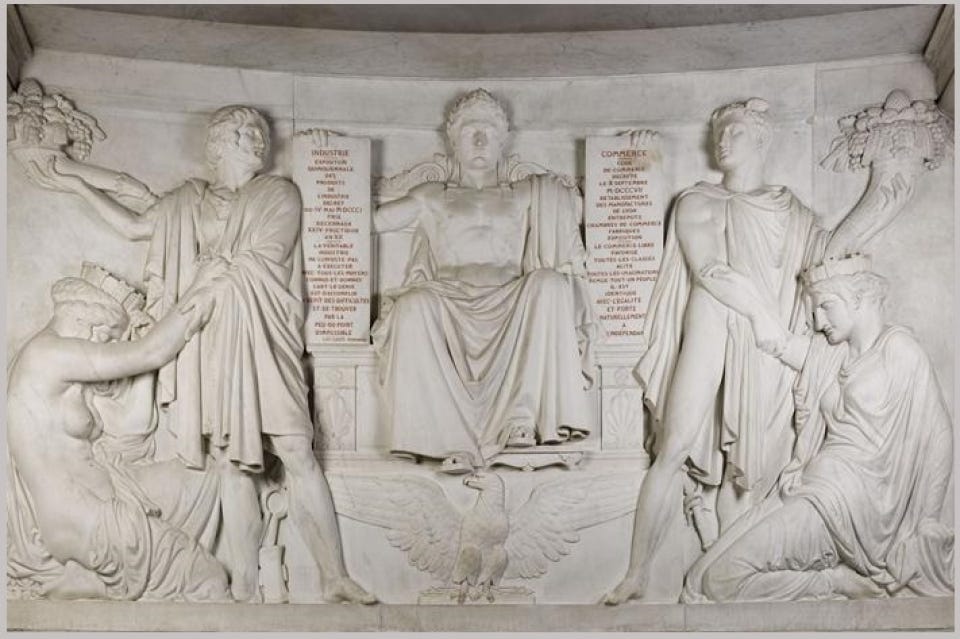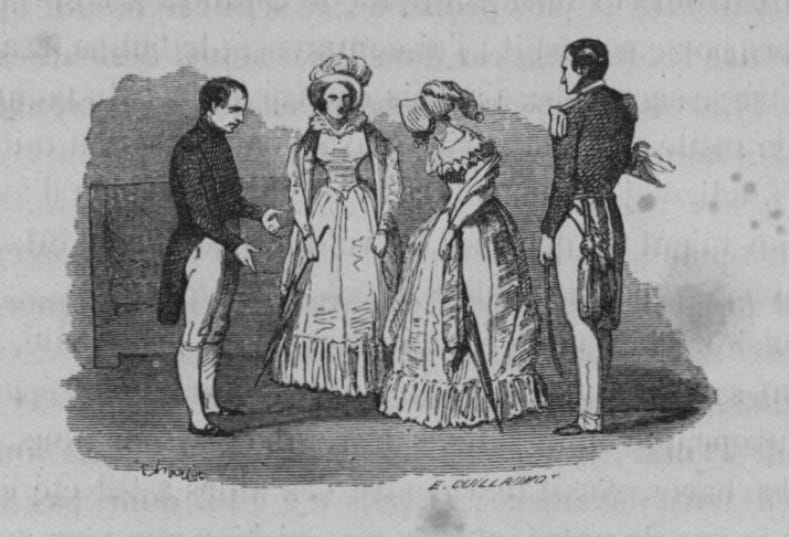Napoleon I on the Continental Blockade
From the Bulletin des Lois, Memoirs of Napoleon, Le Moniteur, Memorial of Saint Helena
It is often said that Napoleon was “an enemy of commerce”. An outrageous calumny by a sliver of propagandists and historians who perpetuate the idea that the Continental System was a blunder with no results. In reality, Napoleon aimed for the most free movement of goods from the furthest reaches of the globe into his Empire. What motivated the Continental System was not some petty tantrum as is alleged. It was a response to the actions of Britain to impede trade. One only has to look at the inventories of British ports at the time to see that the effect was very painful, and meant to force reconciliation after many fruitless attempts. I hope that the following passages will clear up the matter once and for all.
Reasons for the decree declaring the British Isles to be in a state of blockade (Berlin Decree, November 21st 1806)
Napoleon, Emperor of the French, King of Italy;
Considering,
That England does not recognize the Law of Nations universally acknowledged by all civilized peoples ;
That she declares as an enemy every individual belonging to an enemy State, and, in consequence, makes prisoners of war, not only the crews of armed vessels, but also merchant vessels, and even of the supercargoes of the same and traders traveling for the purpose of their business
That she extends to merchant vessels, to articles of commerce, and to the property of individuals, the right of conquest, which can only be applied to what belongs to an enemy State;
That she extends to unfortified cities or ports, to harbors and mouths of rivers, the right of blockade, which according to reason and the usage of civilized nations, is applicable only to strong or fortified ports;
That she declares blockaded, places where she has not a single vessel of war, although a place ought not be considered blockaded but when it is so invested as that no approach to it can be made without imminent hazard;
That she even declares places blockaded which her united forces would be incapable of blockading, such as entire coasts, and a whole empire;That this monstrous abuse of the right of blockade has no other goal than to interrupt the communications of different nations, and to elevate the commerce and industry of England upon the ruin of the industry and commerce of the continent;
That this being the evident design of England, whoever deals on the continent in English merchandise favors that design and becomes an accomplice;
That this conduct of England, worthy in all ways of the first ages of barbarism, has benefitted that power to the detriment of all others;
That it is a natural right to oppose to an enemy the same arms he makes use of, to combat him in the same manner, when all ideas of justice and every liberal sentiments are discarded, the result of civilization among men;
We have resolved to enforce against England the usages which she has consecrated in her maritime code.
The dispositions of the present decree shall constantly be considered as fundamental principle of the empire, until England has acknowledged that the rights of war are the same on land as at sea; that it cannot be extended to any private property whatever they may be, nor to persons who are not military, and until the right of blockade be restrained to fortified places, actually invested by competent forces.
We have, consequently, decreed and decree what follows:
ARTICLE I. The British Isles are declared in a state of blockade.
ARTICLE II. All commerce and correspondence with the British Isles are prohibited. In consequence, letters or packets, addressed either to England, to an Englishman, or written in the English language, shall not pass through the post-office and shall be seized.
ARTICLE III. Every subject of England, of whatever rank and condition whatsoever, who shall be found in the countries occupied by our troops, or by those of our allies, shall be made a prisoner of war.
ARTICLE IV. All shops, merchandise, or property whatsoever, belonging to a subject of England, shall be declared lawful prize.
ARTICLE V. The trade in English merchandise is forbidden; all merchandise belonging to England, or coming from its manufactories and colonies, is declared lawful prize.
ARTICLE VI. Half of the product resulting from the confiscation of the goods and possessions declared lawful prize by the preceding articles shall be applied to indemnify the merchants for the losses they have experienced by the capture of merchant vessels taken by English cruisers.
ARTICLE VII. No vessel coming directly from England or from the English colonies or which shall have visited these since the publication of the present decree shall be received in any port.
ARTICLE VIII. Any vessel contravening the above provision by a false declaration shall be seized; and the vessel and cargo shall be confiscated as if it were English property.
ARTICLE IX. Our Court of Prizes in Paris is tasked with final judgment in all appeals arising in our Empire or in the countries occupied by the French Army relating to the execution of the present decree. Our Court of Prizes in Milan shall be tasked with final judgment in the said cases which may arise within our Kingdom of Italy.
ARTICLE X. Communication of the present decree shall be given by our minister of foreign affairs to the Kings of Spain, of Naples, of Holland, and of Etruria, and to our other allies whose subjects, like ours, are the victims of the unjust and barbarous maritime legislation of England.
ARTICLE XI. Our ministers of Foreign Affairs, of War, of the Navy, of Finance and of the Police and our Directors-General of the port are charged with the execution of the present decree so far as it concern them.
[Signed] NAPOLEON.
Causes of the Continental Blockade (Memoirs of Napoleon)
Napoleon had not in the least gotten lost in some blind passion; he knew the good which France lacked; peace with England was the goal he wished to attain. But she made use of her wealth to bribe and turn against him the armies of Europe, and it was only by way of victories that he could hope to dominate the English hatred by subjugating its allies. That is how he was pulled in spite of himself towards the conquest of Europe and to the Continental Blockade.
The necessity for Europe to submit to the Continental Blockade (Le Moniteur, November 11th 1807)
It must be that English commerce find the continent entirely shut, and that these enemies of nations be placed outside of common Law. Woe to the city, which ceding to fleeting egoism, would betray the common cause! It is necessary to suffer with courage, take all the means to harm the common enemy, and force him to recognize the principle that directs all the nations of the continent…
Fortunate effects of the Continental System (Memorial of Saint Helena)
Col. Wilks was for a long time the diplomatic agent of the Company in the Indian Peninsula; he has written a history of that country, is very knowledgeable, especially in chemistry. The Emperor put questions to him relative to all these subjects, and treated them himself with great fluency and spirit. The conversation was lively and varied; and it was maintained for upwards of two hours. Here are its main lines. […]
The Emperor first spoke to him of the English army, its organization, and particularly its system of promotion. He compared it with the French army, and repeated what I have formerly stated elsewhere with regard to its excellent composition, the advantage of the Conscription, the valorous spirit of the French, etc.
Turning to politics, he said, “You lost America by liberation: you will lose India by invasion. The first loss was perfectly natural; as children advance in years, they break the parental bonds. But, for the Hindoos, they are not advancing at all. They still remain children. The catastrophe, therefore, can only proceed from without. You are not aware of all the dangers with which you were threatened by my arms or my negotiations. As for my Continental system, you perhaps laughed at it?” “Sire,” replied the Colonel, “we affected to do so, but all men of good sense felt the full force of it.”—”Well,” continued the Emperor, “I found myself alone with my opinion on the Continent; and I was forced for the moment to employ violence everywhere. Finally, I begin to be understood. The tree already bears its fruit: I made the first steps; time will do the rest....
Had I not fallen, I would have changed the course of commerce, and the direction of industry. I had naturalized in our midst sugar and indigo, I would have naturalized cotton, and many other things also. They would have seen me move the Colonies, if they had persisted to deny us a share of them.”
“Our impulse was immense. Prosperity, progress increased beyond measure. Yet your Ministers proclaimed throughout all Europe that the French were overwhelmed with misery, and were retrograding to a state of barbarism. Thus the view of our internal prosperity strangely surprised the vulgars of our Allies, as well as yourselves who remained disconcerted.
The strides of the Enlightenment in France were gigantic. Ideas were everywhere rectified and extended because we took pains to render science popular. I was informed that you were very good at chemistry; Very well! I will not decide on which side of the water the most able chemist will be found.”—"In France," said the Colonel immediately.
“It is of little importance,” continued the Emperor; “but I maintain that in the mass of the French people there is ten, and perhaps a hundred, times more chemical knowledge than in England; because the manufacturing classes now employ that science in their daily labour. This was one of the characteristics of my school. Had I been allowed sufficient time, there would soon have been no such thing as trades in France; they would all have been converted into arts.”
The Emperor concluded with these remarkable observations: "England and France held in their hands the fate of the world; and particularly that of European civilization. What injury have we not done to each other! What good might we not have done!
Under Pitt’s system, we desolated the world; and what has been the result? You imposed on France a tax of fifteen hundred millions of francs, and raised it by means of Cossacks. I laid a tax of seven billion on you, and made you raise it with your own hands, by your Parliament. Even now, after the victory you have obtained, who can tell whether you may not sooner or later sink under the weight of such a burden?
With Fox’s system, we would have understood each other; we would have accomplished and preserved the emancipation of nations, the dominion of principles. Europe would have presented but a single fleet and a single army. We might have ruled the world. We might every where have established peace and prosperity, either by force or persuasion. Yes, once more, what mischief have we not done! What good we might have done!"






